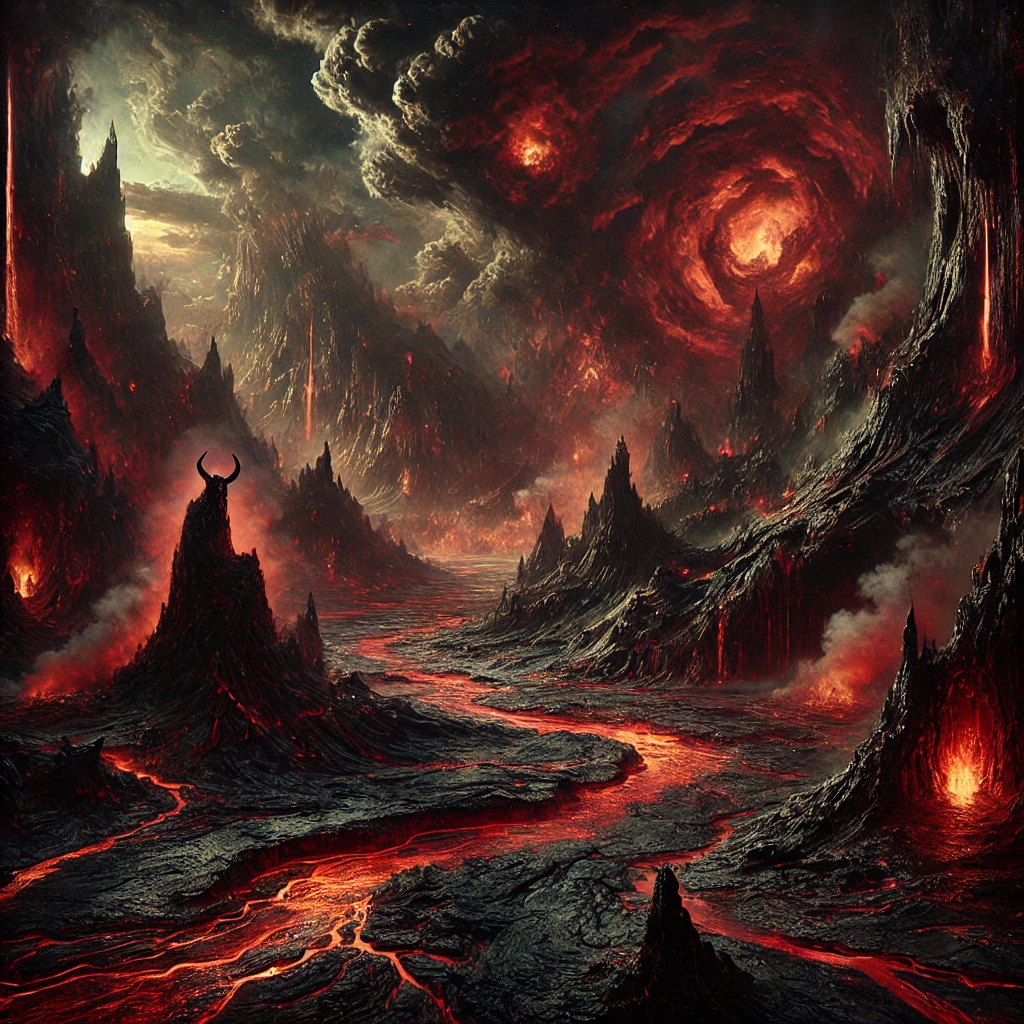Have you ever found yourself wondering about the concept of Hell? It’s one of those topics that can stir up a lot of emotions and spark endless debates. But here’s a question that often comes up: Did God actually create Hell? As Christians, it’s important for us to seek understanding about these tough topics, not just to satisfy our curiosity but to deepen our faith and our relationship with God.
In this article, we’re going to take a closer look at the origins of Hell, what it represents in Christian theology, and address some common questions and misconceptions that often surround its creation. By exploring what the Bible says, reflecting on theological insights, and considering the historical context, we can gain a clearer perspective on this challenging issue. So, let’s dive in together and explore the question: Did God create Hell?
The Concept of Hell in Christian Theology

Defining Hell: An Overview of What Hell Is According to Christian Beliefs
Hell is often depicted as a place of eternal punishment, fire, and torment—a realm reserved for the wicked and the unrepentant. But beyond the imagery and the metaphors, Hell represents something much deeper in Christian theology. It’s seen as the ultimate consequence of a life lived in rejection of God’s grace and love. In its essence, Hell is defined as a state of total separation from God, the source of all life and goodness. This understanding helps us frame Hell not just as a physical place, but as a spiritual reality where the absence of God is profoundly felt.
Hell in the Bible: Key Scriptures That Reference Hell
The concept of Hell is rooted in Scripture, with various references that span both the Old and New Testaments. In the Old Testament, the Hebrew word “Sheol” is often used to describe the realm of the dead—a shadowy existence rather than a place of torment. As we move into the New Testament, Jesus Himself speaks of Hell using the term “Gehenna,” a reference to a valley outside Jerusalem that was associated with fire and destruction. Key passages such as Matthew 10:28, where Jesus warns about the dangers of Hell, and Revelation 20:14-15, which describes the final judgment, provide us with glimpses into the nature of Hell as a place of divine judgment.
The Purpose of Hell: Understanding the Theological Reasoning Behind Hell as a Place of Judgment and Separation from God
Theologically, Hell serves as a place of judgment where God’s justice is fully realized. It is the ultimate destination for those who have chosen to live in defiance of God’s will, rejecting His offer of salvation through Jesus Christ. Hell’s existence underscores the seriousness of sin and the reality of free will—where individuals have the freedom to choose or reject God, with eternal consequences. While the concept of Hell may be difficult to reconcile with God’s love, it also highlights His holiness and justice, ensuring that evil and sin do not go unpunished.
The Creation of Hell: Biblical Perspectives

Did God Intentionally Create Hell?
One of the most profound questions surrounding Hell is whether it was intentionally created by God. The Bible provides insights, though it doesn’t directly spell out God’s intentions regarding Hell’s creation. In Matthew 25:41, Jesus mentions “the eternal fire prepared for the devil and his angels,” indicating that Hell was not originally designed for humanity but as a place of punishment for those who rebelled against God. This suggests that Hell was a necessary outcome rather than an original design, meant to address the existence of sin and evil in a world created by a holy and just God.
Hell as a Consequence: How Hell Is Often Portrayed as the Result of Rebellion Against God Rather Than a Place Created with Intent
Biblically, Hell is often depicted not as a place God delighted in creating but as a necessary consequence of rebellion against His divine order. When humanity chose sin over obedience, the result was separation from God—Hell being the ultimate manifestation of that separation. The narrative of Scripture reveals that Hell is more about the inevitable outcome of choices made in opposition to God’s will. It’s a stark reminder of the gravity of sin and the reality of free will, where individuals have the freedom to choose their path, even if that path leads away from God.
The Fall of Lucifer: Discussing the Connection Between Lucifer’s Rebellion and the Existence of Hell
The story of Lucifer, an angel who rebelled against God and became Satan, is closely linked to the concept of Hell. According to Christian tradition, Lucifer’s pride and subsequent fall from grace led to the establishment of Hell as a place of punishment for him and the angels who followed him. Isaiah 14:12-15 and Ezekiel 28:12-17 offer glimpses into Lucifer’s rebellion, portraying him as a once-glorious being who sought to exalt himself above God. Hell, in this context, can be seen as the domain of those who, like Lucifer, choose to reject God’s authority, making it a place not created with intent but rather one that came into existence due to the consequences of rebellion.
Theological Interpretations of Hell’s Creation

Early Church Fathers’ Views: How Early Christian Theologians Like Augustine and Tertullian Interpreted the Creation of Hell
The early Church Fathers offered profound insights into the nature and purpose of Hell. Augustine, for instance, viewed Hell as a place of eternal punishment designed for those who rejected God’s grace, emphasizing God’s justice. Tertullian, another prominent theologian, spoke of Hell as a literal place where the wicked suffer. These early interpretations were foundational in shaping the Christian understanding of Hell as both a necessary consequence of sin and a demonstration of divine justice. For these theologians, Hell was not merely a concept but a real and terrifying destination for those who chose to turn away from God.
Different Denominational Beliefs: How Various Christian Denominations Perceive the Creation and Purpose of Hell
Across the spectrum of Christian denominations, there are differing views on the creation and purpose of Hell. For instance, traditional Catholic doctrine has long held that Hell is a literal place of eternal punishment for unrepentant sinners, created by God as part of the divine order of justice. In contrast, some Protestant denominations, like the Seventh-day Adventists, view Hell as a temporary state that ultimately leads to the annihilation of the wicked, rather than eternal torment. Meanwhile, Eastern Orthodox theology often emphasizes Hell as a state of being, where the experience of God’s presence is tormenting for those who have rejected Him. These varying interpretations highlight the diversity of thought within Christianity regarding Hell’s origins and purpose.
Hell as a Metaphor or Literal Place: Debating Whether Hell Is a Physical Location or a Metaphorical State of Separation from God
One of the most significant debates in Christian theology revolves around whether Hell should be understood as a physical place or as a metaphorical state of being. Some theologians argue that Hell is a literal location where the damned suffer eternally, a view supported by traditional interpretations of scripture. Others suggest that Hell is more metaphorical, representing a state of complete separation from God rather than a physical place of fire and brimstone. This interpretation sees Hell as the anguish of being eternally distant from God’s love and grace, rather than a geographical location. The debate continues to be a central topic in theological discussions, reflecting the complexity and depth of understanding the concept of Hell.
The Justice and Mercy of God

Balancing Justice with Mercy: How the Concept of Hell Fits into the Broader Narrative of God’s Justice and Mercy
The concept of Hell is often seen as a stark representation of God’s justice—where sin is met with appropriate consequences. However, in the broader narrative of Christian theology, this justice is always balanced with God’s profound mercy. While Hell serves as a place of judgment, the Bible also emphasizes God’s desire that none should perish, but that all should come to repentance (2 Peter 3:9). This duality of justice and mercy is at the heart of the Christian faith. God’s justice demands that sin be addressed, but His mercy offers a way of escape through Christ. Hell, then, is not merely a testament to God’s wrath, but also a reflection of His respect for human freedom and the serious consequences of rejecting His love.
Is Eternal Punishment Just? Addressing the Ethical Questions Surrounding Eternal Punishment and God’s Nature
The notion of eternal punishment raises significant ethical questions: Is it just for God to impose eternal suffering for temporal sins? This question has been the subject of intense theological debate. Some argue that the eternal nature of Hell is justified because it reflects the infinite holiness of God and the grave offense that sin represents against Him. Others contend that eternal punishment seems incompatible with a loving God. Within this discussion, it’s crucial to consider that God’s ways are higher than our ways (Isaiah 55:9). The eternal nature of Hell is often understood as a natural consequence of a soul’s final and unrepentant choice to reject God, rather than a punishment imposed by a vindictive deity. This perspective emphasizes God’s respect for human autonomy and the gravity of choosing separation from Him.
The Role of Free Will: How Human Choice Plays into the Existence of Hell and God’s Judgment
Central to the Christian understanding of Hell is the concept of free will. God, in His love, created humans with the freedom to choose or reject Him. Hell, then, is often viewed not as a place God sends people, but as a state they choose for themselves by turning away from Him. The existence of Hell underscores the seriousness of free will and the consequences that come with it. C.S. Lewis famously suggested that the doors of Hell are locked from the inside, implying that those who are there have chosen it through their rejection of God’s grace. This view highlights the justice of God—honoring the choices of individuals—while also emphasizing His mercy, always offering a way back to Him through repentance.
Common Misconceptions About Hell
Hell as a Human Invention: Addressing the Argument That Hell Was Created by Humans to Control Behavior
One of the most common misconceptions about Hell is the idea that it was a concept invented by religious leaders to instill fear and control behavior. While it’s true that the imagery of Hell has been used throughout history to encourage moral behavior, the concept of Hell itself is deeply rooted in biblical scripture and Christian theology, not merely a human construct. The Bible speaks extensively about Hell as a place of judgment and separation from God (Matthew 25:41, Revelation 20:14-15). Understanding Hell as a divine reality rather than a human invention helps us approach it with the seriousness and reverence it demands, recognizing it as part of God’s overall plan of justice and redemption rather than a tool of manipulation.
Hell in Popular Culture: How Media and Literature Have Shaped the Modern Perception of Hell
The modern perception of Hell has been significantly shaped by popular culture, often distorting the biblical understanding of it. From Dante’s Inferno to modern films and literature, Hell is frequently depicted as a fiery underworld ruled by Satan, filled with endless torment. While these portrayals can be powerful, they are often more reflective of artistic interpretation than biblical truth. The Bible describes Hell as a place of separation from God, often using metaphorical language to convey the seriousness of rejecting God’s grace. As Christians, it’s important to discern between cultural depictions and theological truths, ensuring that our understanding of Hell is grounded in scripture rather than influenced by sensationalized portrayals.
The Difference Between Hell and Hades: Clarifying Common Terms and Their Meanings Within Christian Theology
Another common misconception involves the confusion between the terms Hell, Hades, Gehenna, and Sheol. In Christian theology, these terms have distinct meanings and should not be used interchangeably. Hades, for example, is often understood as a temporary place where souls reside before the final judgment, while Hell (or Gehenna) is depicted as the final destination of eternal separation from God. Sheol is an Old Testament term that refers to the grave or the realm of the dead. Understanding these distinctions helps clarify biblical teachings on the afterlife and prevents the conflation of different theological concepts. It also allows for a more nuanced discussion about the nature of judgment and the afterlife in Christian belief.
The Modern Debate: Does Hell Still Matter?

Relevance in Today’s World: Discussing Whether the Concept of Hell Holds Significance in Contemporary Christian Thought
In a world increasingly focused on inclusivity and tolerance, the concept of Hell can seem harsh, outdated, or even irrelevant. Many contemporary Christians struggle with the idea of eternal punishment, questioning how it aligns with a loving and merciful God. Despite these challenges, the concept of Hell remains significant in Christian thought. Hell serves as a reminder of the seriousness of sin and the consequences of rejecting God’s grace. It also underscores the need for salvation and the importance of sharing the gospel. While the presentation of Hell may evolve with time, its theological importance continues to resonate as a key component of the Christian faith, reminding believers of the gravity of their choices and the reality of eternal separation from God.
Hell and the Afterlife: How Beliefs About Hell Influence Views on the Afterlife
Beliefs about Hell profoundly shape how Christians view the afterlife. The concept of Hell as a place of eternal separation from God emphasizes the stark contrast between the outcomes of a life lived in faith and one lived in rejection of God. This dichotomy influences how Christians approach their spiritual journey, often serving as a motivation for living according to God’s will and sharing their faith with others. Additionally, the belief in Hell impacts how Christians understand justice and the ultimate resolution of evil. In a world where injustice often seems to go unpunished, the doctrine of Hell provides a theological framework for understanding divine justice and the final restoration of order in the afterlife.
Contemporary Theologians’ Perspectives: How Modern Theologians Are Reshaping the Conversation Around Hell
In recent years, many theologians have reexamined traditional views of Hell, offering new perspectives that reflect modern sensibilities while remaining faithful to scripture. Some have explored the idea of annihilationism, where the souls of the wicked are ultimately destroyed rather than suffering eternal torment. Others have delved into the concept of universal reconciliation, suggesting that all souls may eventually be redeemed. These discussions reflect a broader trend in contemporary theology to wrestle with the tension between God’s justice and mercy. While these newer interpretations challenge traditional views, they also invite believers to engage more deeply with their faith, considering the complexities of divine judgment and the nature of eternity. Ultimately, these evolving perspectives highlight the ongoing relevance of Hell in theological discourse, encouraging Christians to reflect on the mysteries of the afterlife with both humility and hope.
Conclusion
Throughout this exploration, we have delved into the concept of Hell from various angles, examining its origins, purpose, and significance within Christian theology. We’ve considered biblical references, the perspectives of early church fathers, and the ongoing theological debate about Hell’s nature—whether it is a literal place or a metaphorical state of separation from God. Additionally, we’ve discussed how Hell fits into the broader narrative of God’s justice and mercy, and how modern interpretations continue to reshape the conversation.
The question of whether God created Hell is deeply intertwined with our understanding of divine justice, mercy, and the human experience. As believers, it’s essential to grapple with these concepts, not just as abstract theological ideas, but as truths that impact our daily lives and spiritual journey. Reflecting on Hell invites us to consider the weight of our choices, the reality of divine judgment, and the boundless grace offered through Christ. I encourage you to take some time to ponder your own beliefs about Hell and how they align with your understanding of God’s character.
The subject of Hell is vast and complex, with many layers to uncover. If this discussion has sparked questions or curiosity, I invite you to dive deeper. Explore scripture, seek out theological writings, and engage in personal reflection or discussion with others in your faith community. Understanding the concept of Hell is not just about grasping a doctrine—it’s about enriching your faith and growing closer to the truth of God’s word. Remember, the journey of faith is ongoing, and every step brings you closer to the heart of God.
FAQ: Did God Create Hell?
1. What is Hell according to Christian beliefs?
Hell is traditionally understood in Christian theology as a place of eternal separation from God, reserved for those who reject God’s grace and persist in sin. It is often depicted as a place of punishment and torment, though interpretations of its nature vary across different denominations and theological perspectives.
2. Did God intentionally create Hell?
The Bible does not explicitly state that God created Hell as part of His original creation. Some theological perspectives suggest that Hell exists as a consequence of rebellion against God, rather than as a place created with specific intent. It is often associated with the fall of Lucifer and the subsequent separation from God’s presence.
3. How does the concept of Hell fit with God’s mercy and justice?
Christian theology holds that God is both just and merciful. Hell is seen as part of God’s justice, where the consequences of sin and rebellion are fully realized. However, God’s mercy is evident in the offer of salvation through Jesus Christ, providing a way for humanity to avoid eternal separation and instead receive eternal life with God.
4. Is Hell a literal place or a metaphorical state?
There is ongoing debate within Christian theology about whether Hell is a literal place of physical torment or a metaphorical state of separation from God. Some theologians argue that Hell represents a spiritual condition rather than a physical location, emphasizing the relational aspect of being apart from God.
5. What is the difference between Hell and Hades?
In Christian theology, Hell and Hades are often used interchangeably, but they have distinct meanings. Hades is generally understood as the place of the dead or the temporary abode of souls before the final judgment, while Hell (or Gehenna) is seen as the final place of punishment for the wicked after the judgment.
6. How has popular culture influenced our understanding of Hell?
Popular culture, through media, literature, and art, has significantly shaped modern perceptions of Hell, often emphasizing its most terrifying aspects. These portrayals can sometimes overshadow or distort the theological understanding of Hell, leading to misconceptions and a more sensationalized view of this concept.
7. Does the concept of Hell still matter in today’s world?
The relevance of Hell in contemporary Christian thought varies. For some, it remains a critical aspect of their faith, emphasizing the importance of salvation and the consequences of sin. For others, the focus has shifted towards more positive aspects of Christian theology, such as grace and redemption, with Hell being less emphasized or reinterpreted.
8. How can I explore this topic further?
To deepen your understanding of Hell and its place in Christian theology, consider studying relevant Bible passages, reading theological works by respected scholars, and engaging in discussions with your faith community. Reflecting on this topic can lead to a more nuanced and informed view of God’s justice, mercy, and the nature of the afterlife.
Reassurance in Christ: The Promise of Salvation
As we explore the profound and often challenging concept of Hell, it’s important to remember the hope and reassurance that comes through Jesus Christ. The good news of the Gospel is that Jesus came to earth, lived a sinless life, and willingly sacrificed Himself on the cross so that we wouldn’t have to face eternal separation from God. Hell, while a real and sobering concept, does not have to be our destination.
Jesus’ death and resurrection offer us a path to eternal life with God. By accepting Him as our Lord and Savior, we are assured of His grace and forgiveness, freeing us from the fear of Hell. This is the heart of Christian faith: that through Christ, we are redeemed and given the promise of everlasting life. If you haven’t yet made that decision, or if you’re looking to deepen your relationship with Jesus, I encourage you to reflect on His love and sacrifice. It’s never too late to embrace the gift of salvation He offers.
check out our article on 7 Astonishing Facts About the Miraculous Birth of Jesus. This article uncovers the mysteries surrounding the Nativity story and offers fresh insights into one of the most pivotal moments in Christian history.
Exploring the Deeper Questions: A Broader Theological Perspective
As we’ve discussed, the concept of Hell and its place in Christian theology raises many deep and complex questions. For those who are interested in delving further into these topics, I highly recommend exploring additional theological resources that provide greater context and insight into these important discussions. One such resource is the article on “The Nature of Heaven and Hell” from Bible.org.
This article offers a thorough examination of both Heaven and Hell, discussing their roles in the broader Christian narrative and providing a balanced perspective on what these places represent. It’s an excellent starting point for anyone looking to expand their understanding of these foundational elements of faith.



